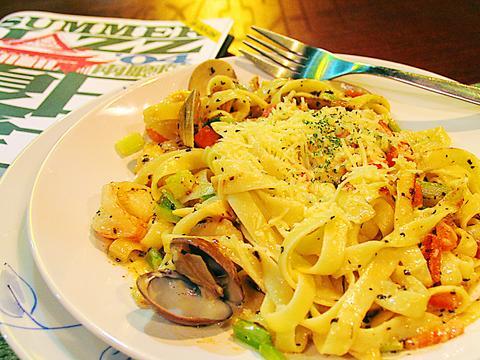This is the story of Chocolate and Love -- and serendipity.
Barry Smit flew to Taipei from Amsterdam with his girlfriend and a plan to open a restaurant. He'd never run one before, but partnering with his girlfriend's uncle, Tony, seemed a safe enough bet. Shortly after they arrived, the girlfriend went by the wayside, but Barry and Tony's relationship has blossomed into one of the hipper eateries east of Dunhua.
The place has the feel of a jazz joint. In fact, there has been live music in the upstairs and Smit is currently planning upcoming gigs. Chocolate and Love also hosts the Taipei Poets Society, whose handwritten works adorn the walls. Last Saturday they hosted a Caribbean party that went into the small hours.

PHOTO: DAVID MOMPHARD, TAIPEI TIMES
But if you've only come for music or poetry, you're missing the pasta. Pescatore basilico (NT$200), seafood and basil herb in a creamy sauce, is al dente pasta piled with shrimp, clams and scallops. If the scallops aren't surprise enough, the spiced celery surely will be.
"I lived in Italy for a while," says Smit. "And I know Chinese love noodles. So I wanted to get the pastas right."
Other options, to name just a few, include antonella (NT$160), clams and jalapeno chilis in a tomato and garlic sauce or the same seafood combination as the pescatore basilico but with a pomodori tomato sauce (NT$200). All the pastas run between NT$150 and NT$200 and come with bread and the soup of the day (either cream corn, tomato and cabbage, onion or spinach cream). They're also available during the lunch hour in smaller portions, at smaller prices.
Smit says the formula is to make Chocolate and Love "a place where West meets East and East meets West."
There's little in the way of chocolate to be found in the place, but Barry and Tony have put their love into it.
"I greet people as they come in the door and show them out. Little Western touches like that, we hope makes it special. If a place is comfortable and the conversation is friendly, the food and the drinks taste better."
Does being a restaurant owner come naturally? Smit gives a look as if to say he's not sure it comes at all. It does. It's serendipity.

May 18 to May 24 Pastor Yang Hsu’s (楊煦) congregation was shocked upon seeing the land he chose to build his orphanage. It was surrounded by mountains on three sides, and the only way to access it was to cross a river by foot. The soil was poor due to runoff, and large rocks strewn across the plot prevented much from growing. In addition, there was no running water or electricity. But it was all Yang could afford. He and his Indigenous Atayal wife Lin Feng-ying (林鳳英) had already been caring for 24 orphans in their home, and they were in

On May 2, Chinese Nationalist Party (KMT) Chairman Eric Chu (朱立倫), at a meeting in support of Taipei city councilors at party headquarters, compared President William Lai (賴清德) to Hitler. Chu claimed that unlike any other democracy worldwide in history, no other leader was rooting out opposing parties like Lai and the Democratic Progressive Party (DPP). That his statements are wildly inaccurate was not the point. It was a rallying cry, not a history lesson. This was intentional to provoke the international diplomatic community into a response, which was promptly provided. Both the German and Israeli offices issued statements on Facebook

President William Lai (賴清德) yesterday delivered an address marking the first anniversary of his presidency. In the speech, Lai affirmed Taiwan’s global role in technology, trade and security. He announced economic and national security initiatives, and emphasized democratic values and cross-party cooperation. The following is the full text of his speech: Yesterday, outside of Beida Elementary School in New Taipei City’s Sanxia District (三峽), there was a major traffic accident that, sadly, claimed several lives and resulted in multiple injuries. The Executive Yuan immediately formed a task force, and last night I personally visited the victims in hospital. Central government agencies and the

Australia’s ABC last week published a piece on the recall campaign. The article emphasized the divisions in Taiwanese society and blamed the recall for worsening them. It quotes a supporter of the Taiwan People’s Party (TPP) as saying “I’m 43 years old, born and raised here, and I’ve never seen the country this divided in my entire life.” Apparently, as an adult, she slept through the post-election violence in 2000 and 2004 by the Chinese Nationalist Party (KMT), the veiled coup threats by the military when Chen Shui-bian (陳水扁) became president, the 2006 Red Shirt protests against him ginned up by